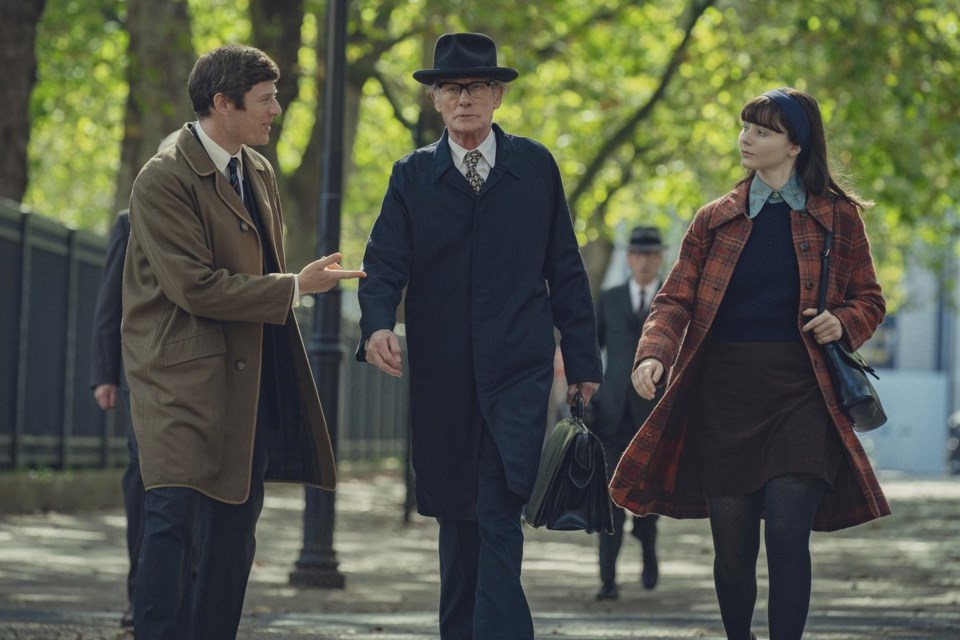Toward the end of Netflix's ŌĆ£Joy,ŌĆØ the muffled cry of a newborn baby prompts a man and woman in a hospital to embrace out of pure bliss. They aren't the parents, but they had as much to do with the birth as the mom and dad.
This charming and winning movie charts the decade-long true story of how the worldŌĆÖs first IVF baby was born in England in 1978 ŌĆö a 5-pound, 12-ounce girl who paved the way for millions more. It's an upbeat, very English affair, mixing sober discussion of endometriosis with chocolate biscuits.
The couple embracing that day were pioneering scientist Robert Edwards and Jean Purdy, a young nurse and embryologist. Together with surgeon Patrick Steptoe, the trio succeeded with in vitro fertilization, a method of treating infertility. Edwards would go on to win the Nobel Prize.
ŌĆ£JoyŌĆØ has been birthed at a time when science is under threat in America ŌĆö ŌĆö so it's downright inspiring to see plucky, smart scientists working hard to change the world. ŌĆ£What weŌĆÖre doing, it matters,ŌĆØ says Steptoe, played with quiet economy by Bill Nighy.
ŌĆ£JoyŌĆØ is the personal stories of the three scientists ŌĆö mostly through the eyes of Purdy, a polite lab-coated warrior. ŌĆ£If I hear a commotion, IŌĆÖm not very good at staying out of it,ŌĆØ she says. Perfectly played by Thomasin McKenzie, Purdy is both vulnerable and strong, learning through the process to be a better human. James Norton plays Edwards with charm, self-doubt and calm spirit.
Jack Thorne's script nicely explains the massive pressure the trio faced. IVF may have become common and uncontroversial over the last decades, but back in the late '70s it was experimental and shunned. The Anglican church called it a sin, the newspapers labeled it Frankenstein-ish and other scientists warned of freak babies. ŌĆ£YouŌĆÖre aware theyŌĆÖll throw the book at us,ŌĆØ Nighy's Steptoe tells the team. ŌĆ£We will unite them all against us.ŌĆØ
Purdy, a single woman as the swinging ŌĆś60s lead to the ŌĆÖ70s, is exiled by her own pious mother ŌĆö ŌĆ£You canŌĆÖt play God with this,ŌĆØ the elder woman tells her daughter ŌĆö and disinvited by her church. No matter. ŌĆ£This fight is ours. We donŌĆÖt have a choice,ŌĆØ Purdy says. The film also celebrates the brave would-be mothers who volunteered their bodies to be poked and prodded at the edge of science.
Our hero researchers try to argue to the skeptical world in vain that IVF is simply a way for science to help those in need, like glasses for the shortsighted or dentures for those with teeth decay. It's remarkable to return to this debate now when science's great achievements today may be under threat,
Director Ben Taylor keeps the story small and intimate, a series of vignettes adding up to almost like a play. It features moments of quiet and polite bravery, and small conversations over a pint of ale ŌĆö a reminder of the power of performances and that changing the world doesn't need a muscle-bound bro with X-ray vision.
It's held together by a superb soundtrack with witty selections like ŌĆ£Yes We Can CanŌĆØ by Lee Dorsey, ŌĆ£Nobody But MeŌĆØ by The Human Beinz and ŌĆ£Here Comes the SunŌĆØ by George Harrison, each song encapsulating the moment in time, like pearls on a strand.
ŌĆ£JoyŌĆØ is not all joy. There is frustration and loss and tears along the way, but it is a triumphant film about the way humans can make the world better and how a baby's cry can be a priceless gift.
ŌĆ£Joy,ŌĆØ a Netflix release, is rated PG-13 for ŌĆ£thematic material brief strong language, some sexual references and surgery images.ŌĆØ Running time: 115 minutes. Three and a half stars out of four.
Mark Kennedy, The Associated Press



